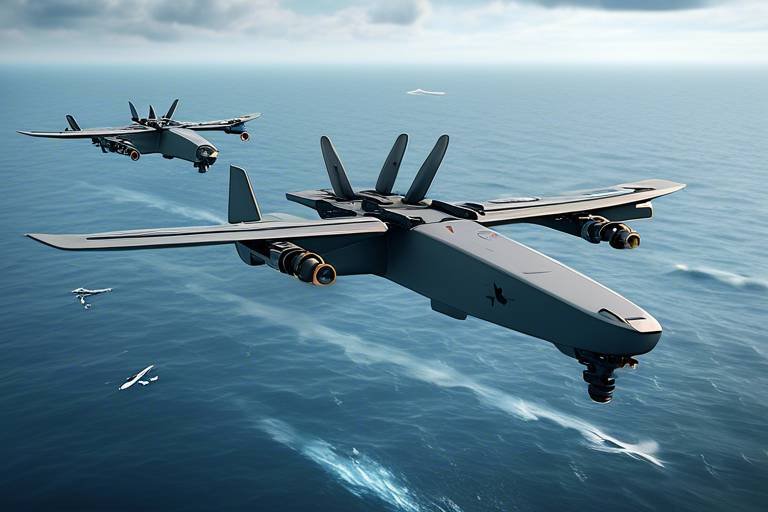How AI is Enhancing Defense Procurement Processes
In today's rapidly evolving world, artificial intelligence (AI) is not just a buzzword; it's a game-changer, especially in the realm of defense procurement. The traditional methods of acquiring defense resources often involve lengthy processes, complex decision-making, and significant financial implications. However, with the integration of AI technologies, these processes are undergoing a remarkable transformation. Imagine a world where procurement decisions are not just based on gut feelings but are backed by data-driven insights. This article delves into how AI is enhancing defense procurement, making it more efficient, cost-effective, and strategic.
One of the most significant impacts of AI on defense procurement is its ability to streamline operations. By automating repetitive tasks, AI reduces the time and effort spent on mundane activities, allowing procurement professionals to focus on what really matters: strategic decision-making. For instance, AI can handle tasks such as data entry, invoice processing, and even initial supplier evaluations. This leads to quicker turnaround times, enabling defense agencies to respond rapidly to changing needs. Just think about it: instead of sifting through mountains of paperwork, procurement teams can devote their energies to building relationships and negotiating better deals.
In the age of information, data is king. Utilizing AI for data analysis empowers defense organizations to make informed decisions based on real-time data. By analyzing vast amounts of information, AI helps identify trends, optimize procurement strategies, and ensure better resource allocation. For example, AI can analyze historical purchasing data to forecast future needs, helping agencies prepare for upcoming demands. This proactive approach not only enhances efficiency but also significantly reduces the risk of last-minute rushes or shortages in critical supplies.
Predictive analytics powered by AI is like having a crystal ball for procurement needs. It allows defense agencies to foresee future requirements, ensuring they are always one step ahead. By leveraging algorithms that analyze past data, AI can forecast everything from equipment needs to supply chain disruptions. This foresight is crucial in the defense sector, where timely access to resources can mean the difference between success and failure.
In any procurement process, risk management is paramount. AI tools can assess risks associated with various suppliers and procurement strategies, providing a proactive approach to mitigating potential issues. For instance, AI can evaluate supplier reliability by analyzing past performance data, financial stability, and even market conditions. This ensures that defense organizations are not left in the lurch when unexpected challenges arise.
Maintaining high standards in the supply chain is critical for defense organizations. AI systems can continuously monitor supplier performance, offering insights into reliability and quality. This data-driven evaluation allows procurement teams to make informed decisions about which suppliers to engage with, ensuring that only the best resources are utilized. Imagine having a dashboard that provides real-time updates on supplier performance—this is the power of AI in action.
Effective procurement isn't just about numbers; it's about relationships. AI fosters better communication and collaboration between defense agencies and suppliers. By streamlining interactions—whether through automated communication tools or data-sharing platforms—AI helps build stronger partnerships. These enhanced relationships can lead to more effective procurement outcomes, as both parties work together towards common goals.
When it comes to defense procurement, every dollar counts. AI technologies contribute to significant cost savings by optimizing processes and reducing waste. By automating routine tasks and improving decision-making, organizations can allocate budgets more effectively, ultimately achieving better value for taxpayer money. For example, AI can analyze spending patterns and identify areas where costs can be trimmed without compromising quality.
Managing contracts can be a daunting task, filled with compliance requirements and administrative burdens. However, the automation of contract management through AI ensures that these processes run smoothly. With AI handling the nitty-gritty details, procurement teams can focus on strategic negotiations and relationship-building with suppliers, which is where the real value lies.
AI doesn't just help in managing current expenses; it also plays a vital role in identifying future cost-saving opportunities. By analyzing historical spending data, AI can uncover patterns that may not be immediately apparent to human analysts. This insight empowers defense organizations to make smarter purchasing decisions and optimize their budgets, ultimately leading to significant savings.
- How does AI impact the speed of procurement processes?
AI automates repetitive tasks, allowing procurement teams to focus on strategic decisions, leading to faster turnaround times. - Can AI help in risk management?
Yes, AI tools assess risks associated with suppliers and procurement strategies, helping organizations mitigate potential issues before they escalate. - What are the cost benefits of using AI in defense procurement?
AI optimizes processes, reduces waste, and identifies cost-saving opportunities, resulting in better value for taxpayer money.

Streamlining Procurement Operations
Artificial Intelligence (AI) is not just a buzzword; it’s a game-changer in the world of defense procurement. Imagine a world where tedious tasks are automated, allowing professionals to focus on what truly matters—strategic decision-making. With AI, this is becoming a reality. By automating repetitive tasks, such as data entry and invoice processing, procurement teams can significantly reduce the time and effort spent on mundane activities. This leads to quicker turnaround times, ensuring that the right resources are available when they’re needed most.
Moreover, AI technologies can analyze past procurement cycles to identify bottlenecks and inefficiencies. For instance, if a particular supplier consistently delays deliveries, AI can flag this issue, prompting procurement managers to take action before it impacts operations. This proactive approach not only enhances efficiency but also fosters a culture of continuous improvement within procurement teams.
To illustrate the impact of AI on procurement operations, consider the following benefits:
- Increased Efficiency: By automating routine tasks, teams can redirect their efforts toward strategic initiatives.
- Improved Accuracy: AI minimizes human error in data handling, leading to more reliable procurement processes.
- Enhanced Collaboration: AI tools facilitate better communication among team members and stakeholders, ensuring everyone is on the same page.
In addition, AI can help establish a more transparent procurement process. With real-time data analytics, stakeholders can access up-to-date information on procurement activities, fostering trust and accountability. This transparency is crucial in defense procurement, where compliance and ethical standards are paramount.
Furthermore, AI-driven platforms can provide valuable insights into supplier performance and market trends. By leveraging these insights, procurement professionals can make informed decisions that align with organizational goals. For example, if AI identifies a trend toward sustainable materials, procurement teams can adjust their strategies to source environmentally friendly options, demonstrating a commitment to corporate social responsibility.
In summary, AI is revolutionizing the way defense procurement operations are conducted. By streamlining processes, enhancing collaboration, and providing actionable insights, AI empowers procurement teams to operate more efficiently and effectively. As we continue to embrace these technologies, the future of defense procurement looks not only more efficient but also more strategic and impactful.
- What is AI in defense procurement? AI refers to the use of advanced algorithms and machine learning to automate and enhance various procurement processes, leading to improved efficiency and decision-making.
- How does AI improve procurement efficiency? AI automates repetitive tasks, analyzes data for better insights, and facilitates real-time communication, allowing procurement teams to focus on strategic goals.
- Can AI help in risk management? Yes, AI tools can assess risks associated with suppliers and procurement strategies, helping organizations mitigate potential issues before they escalate.

Data-Driven Decision Making
In today's fast-paced world, has become a cornerstone of effective procurement strategies, particularly in the defense sector. Imagine trying to navigate a ship through fog without a compass; that's what procurement professionals face when they lack reliable data. With the sheer volume of data generated daily, artificial intelligence (AI) steps in as a guiding light, illuminating the path toward informed decisions. By harnessing the power of AI for data analysis, defense organizations can sift through vast oceans of information, identifying trends and optimizing procurement strategies like never before.
One of the most significant advantages of using AI in decision-making is its ability to process and analyze data at lightning speed. Traditional methods of data analysis can be time-consuming and prone to human error, often leading to missed opportunities or costly mistakes. However, AI algorithms can quickly analyze historical spending patterns, supplier performance metrics, and even market trends, allowing procurement teams to make timely and informed decisions. For instance, AI can highlight which suppliers consistently deliver high-quality products on time, helping organizations prioritize their partnerships and negotiate better terms.
Moreover, the integration of AI in data analysis not only enhances decision-making but also improves resource allocation. By understanding the nuances of their procurement needs through data insights, defense agencies can allocate resources more effectively, ensuring that critical supplies are available when needed. This proactive approach minimizes the risk of shortages and helps organizations stay ahead of the curve, adapting to changing demands with agility.
To illustrate the impact of data-driven decision making, consider the following table that outlines key benefits:
| Benefit | Description |
|---|---|
| Informed Decisions | AI analyzes data trends to guide procurement choices, reducing reliance on guesswork. |
| Improved Resource Allocation | Data insights enable better distribution of resources, minimizing waste and shortages. |
| Enhanced Supplier Relationships | Data analysis helps identify reliable suppliers, fostering stronger partnerships. |
| Cost Efficiency | Data-driven insights lead to smarter purchasing decisions, optimizing budgets. |
In summary, powered by AI is revolutionizing the procurement landscape in defense. By leveraging advanced data analytics, organizations can not only enhance their decision-making processes but also improve overall efficiency and effectiveness. As we move forward, the ability to make informed decisions based on solid data will undoubtedly become a critical factor in the success of defense procurement strategies.
- What is data-driven decision making?
Data-driven decision making involves using data analysis to guide decisions, ensuring that choices are based on factual information rather than intuition. - How does AI enhance data-driven decision making?
AI enhances decision making by quickly processing large amounts of data, identifying trends, and providing actionable insights that inform procurement strategies. - Why is data important in defense procurement?
Data is crucial in defense procurement as it helps organizations allocate resources effectively, avoid shortages, and maintain strong supplier relationships.

Predictive Analytics in Procurement
In the fast-paced world of defense procurement, predictive analytics has emerged as a game-changer. Imagine having the ability to foresee future procurement needs before they even arise. That’s precisely what AI-driven predictive analytics brings to the table. By analyzing historical data and current trends, predictive analytics can forecast upcoming demands for various resources, allowing defense agencies to stay one step ahead. This foresight is crucial in avoiding those dreaded last-minute scrambles for supplies, which can lead to costly delays and operational inefficiencies.
Consider this: if a defense organization can anticipate a surge in demand for a specific type of equipment, they can proactively adjust their procurement strategies. This proactive approach not only ensures that they have the necessary resources on hand but also enhances their ability to negotiate better terms with suppliers. After all, when you know what you need and when you’ll need it, you’re in a stronger position to make the best deals. The result? A more streamlined procurement process that saves time and money.
Moreover, predictive analytics can identify patterns in supplier performance and market conditions. For instance, if data shows that certain suppliers consistently deliver late during peak seasons, procurement teams can adjust their strategies accordingly, either by diversifying their supplier base or by placing orders earlier than usual. This level of insight transforms procurement from a reactive process into a strategic one, where decisions are based on data rather than gut feelings.
To illustrate the importance of predictive analytics, consider the following table that highlights the key benefits of integrating predictive analytics into defense procurement processes:
| Benefit | Description |
|---|---|
| Enhanced Forecasting | Accurate predictions of future resource needs based on historical data. |
| Improved Supplier Management | Identifying reliable suppliers and anticipating potential delays. |
| Cost Efficiency | Minimizing rush orders and last-minute purchases that can inflate costs. |
| Strategic Planning | Enabling proactive decision-making for resource allocation and budgeting. |
In summary, the integration of predictive analytics into defense procurement processes is not just a luxury; it's a necessity. By leveraging data to anticipate future needs, defense organizations can enhance their operational efficiency, reduce costs, and ultimately ensure that they are always prepared for whatever challenges lie ahead. The future of procurement is not just about reacting to current demands but about predicting and preparing for future ones. Isn't it time for defense agencies to embrace this transformative approach?
- What is predictive analytics in procurement?
Predictive analytics in procurement involves using data analysis techniques to forecast future procurement needs based on historical data and current trends.
- How does predictive analytics improve decision-making?
By providing insights into future demands and supplier performance, predictive analytics enables organizations to make informed and strategic procurement decisions.
- Can predictive analytics help reduce costs?
Yes, it can help identify cost-saving opportunities and prevent last-minute purchases that often come with higher costs.
- What tools are commonly used for predictive analytics?
Common tools include data analytics software, machine learning algorithms, and specialized procurement analytics platforms.

Risk Assessment and Management
In the complex world of defense procurement, are paramount. With numerous suppliers and a multitude of procurement strategies, the potential for risks is ever-present. Fortunately, artificial intelligence (AI) is stepping in to revolutionize how defense organizations approach these challenges. By leveraging advanced algorithms and machine learning, AI tools can analyze vast datasets to identify and assess risks associated with various suppliers and procurement methods. This proactive approach allows organizations to mitigate potential issues before they escalate, ensuring smoother procurement processes.
Imagine trying to navigate a maze blindfolded; that’s what procurement teams often face without proper risk management. AI acts like a guiding light, illuminating potential pitfalls and providing insights that were previously hidden in heaps of data. For instance, AI can evaluate supplier reliability by analyzing historical performance metrics, financial stability, and compliance with regulations. This data-driven evaluation not only helps in selecting the right suppliers but also in maintaining high standards across the supply chain.
Moreover, AI can monitor real-time data to detect anomalies that may indicate risks, such as sudden price increases or supply chain disruptions. By flagging these issues early, defense organizations can take corrective actions before they impact operational readiness. To elaborate, consider the following key areas where AI enhances risk assessment:
- Supplier Risk Analysis: Evaluating suppliers based on their past performance and current market conditions.
- Market Trend Analysis: Identifying shifts in market dynamics that could affect procurement strategies.
- Compliance Monitoring: Ensuring that suppliers adhere to legal and regulatory requirements.
This comprehensive risk assessment framework not only enhances decision-making but also fosters a culture of accountability and transparency within defense organizations. By integrating AI into their procurement processes, these organizations can make informed choices that align with their strategic objectives while minimizing risks.
In summary, the integration of AI in risk assessment and management transforms the procurement landscape. It empowers defense agencies to be proactive rather than reactive, ensuring that they are always a step ahead in securing the resources they need. As we continue to navigate an increasingly complex global environment, the adoption of AI will be crucial in maintaining operational efficiency and effectiveness in defense procurement.
- What is the role of AI in risk management? AI helps identify and assess risks by analyzing data from multiple sources, enabling organizations to make informed decisions.
- How does AI improve supplier evaluation? AI continuously monitors supplier performance, providing insights into reliability, quality, and compliance, which aids in better supplier selection.
- Can AI predict future procurement risks? Yes, AI uses predictive analytics to forecast potential risks based on historical data and current market trends.
- What are the benefits of using AI in defense procurement? AI enhances efficiency, reduces costs, improves decision-making, and strengthens supplier relationships.

Supplier Performance Evaluation
In the world of defense procurement, ensuring that suppliers meet high standards is not just a preference; it’s a necessity. With the advent of AI systems, defense organizations can now continuously monitor and evaluate supplier performance like never before. Imagine having a tool that acts like a vigilant watchdog, keeping an eye on reliability, quality, and compliance at all times. This capability transforms the procurement landscape, allowing organizations to maintain stringent standards and ensure that they are always getting the best value for their investments.
AI-driven evaluation processes utilize a wealth of data collected from various sources, including past contract performance, delivery timelines, and quality assessments. By analyzing this data, organizations can generate detailed performance reports that highlight strengths and weaknesses in their supply chains. For instance, if a supplier consistently delivers late or fails to meet quality benchmarks, AI can flag these issues promptly, enabling procurement teams to take proactive measures before problems escalate.
Furthermore, the use of predictive analytics allows defense agencies to anticipate potential supplier issues based on historical data trends. This foresight is crucial in a sector where delays or subpar products can have serious implications. By understanding which suppliers are likely to underperform, organizations can make informed decisions about whether to continue partnerships or seek alternatives. Such data-driven insights not only enhance operational efficiency but also foster a culture of accountability among suppliers.
To illustrate the effectiveness of AI in supplier performance evaluation, consider the following table that summarizes key metrics typically monitored:
| Performance Metric | Description | Importance |
|---|---|---|
| On-Time Delivery | Percentage of orders delivered by the agreed date | Critical for maintaining project timelines |
| Quality Compliance | Rate of products meeting specified quality standards | Ensures operational effectiveness and safety |
| Cost Variance | Difference between estimated and actual costs | Helps in budget management and forecasting |
| Supplier Responsiveness | Time taken to respond to inquiries or issues | Indicates level of customer service and support |
By leveraging these metrics, defense organizations can foster better supplier relationships, ensuring that both parties are aligned in their goals and expectations. In a sense, it’s like having a performance coach for your suppliers—constantly evaluating, providing feedback, and pushing for improvement. This not only enhances the quality of supplies but also contributes to a more resilient supply chain capable of adapting to the ever-changing demands of defense operations.
- How does AI improve supplier performance evaluation? AI enhances evaluation by providing real-time data analysis, allowing organizations to monitor supplier performance continuously and make informed decisions based on predictive insights.
- What metrics should be monitored for supplier performance? Key metrics include on-time delivery, quality compliance, cost variance, and supplier responsiveness, which collectively provide a comprehensive view of supplier performance.
- Can AI help in identifying potential supplier issues? Yes, AI can analyze historical performance data to predict potential issues, enabling organizations to take proactive measures to mitigate risks.

Enhancing Supplier Relationships
In the ever-evolving landscape of defense procurement, is not just a nice-to-have; it's a necessity. Imagine your procurement process as a dance—every step, every turn, and every rhythm must be in sync with your suppliers to achieve a harmonious outcome. With the integration of artificial intelligence, this dance has become much smoother and more fluid. AI technologies facilitate better communication and collaboration, breaking down the barriers that often hinder effective partnerships.
One of the most significant advantages of AI in supplier relationship management is its ability to streamline interactions. AI-powered platforms can automate routine communication, ensuring that both parties are always on the same page. This means that procurement professionals can spend less time on administrative tasks and more time fostering relationships that matter. Imagine being able to quickly share updates, negotiate contracts, and resolve issues without the usual back-and-forth delays. This is the magic of AI in action!
Furthermore, AI tools can analyze communication patterns and sentiment, providing insights into how suppliers perceive their relationship with defense agencies. This data can be invaluable. For instance, if a supplier feels undervalued or overlooked, it could lead to poor performance or even a breakdown in the partnership. By regularly assessing these sentiments, procurement teams can proactively address concerns, ensuring that relationships remain strong and collaborative.
Additionally, AI enables defense organizations to tailor their approach to each supplier based on their unique needs and capabilities. This personalized touch can make suppliers feel more appreciated and engaged. For example, if a particular supplier excels in delivering high-quality materials but struggles with timely shipping, procurement teams can work closely with them to develop strategies that leverage their strengths while addressing weaknesses. This not only enhances the supplier's performance but also strengthens the overall supply chain.
Moreover, AI fosters transparency in the procurement process. By utilizing shared platforms where suppliers can access real-time data on orders, inventory levels, and forecasts, both parties can engage in more informed discussions. This transparency builds trust—a crucial element in any successful relationship. When suppliers feel they have a clear understanding of expectations and performance metrics, they are more likely to deliver on their commitments and strive for excellence.
In conclusion, enhancing supplier relationships through AI is about more than just technology; it's about creating a culture of collaboration and trust. By leveraging AI's capabilities, defense organizations can transform their supplier interactions from transactional to strategic partnerships. This shift not only leads to better procurement outcomes but also contributes to a more resilient and responsive defense supply chain.
- How does AI improve communication with suppliers?
AI automates routine communications and provides insights into supplier sentiments, allowing for timely and effective interactions. - Can AI help in resolving supplier issues?
Yes, AI can analyze communication patterns and identify potential issues early, enabling proactive resolutions. - What role does transparency play in supplier relationships?
Transparency fosters trust and allows for more informed discussions, which are essential for successful partnerships. - How can AI personalize supplier interactions?
AI can analyze supplier performance and needs, enabling tailored approaches that enhance engagement and collaboration.

Cost Reduction Strategies
In today's rapidly evolving defense landscape, cost reduction is not just a goal; it's a necessity. With budgets tightening and the demand for advanced technologies increasing, defense organizations are turning to artificial intelligence (AI) as a powerful ally in their quest for efficiency. AI technologies are not merely tools; they are game-changers that help organizations streamline their operations, cut unnecessary expenses, and ultimately deliver better value for taxpayer money.
One of the most significant ways AI contributes to cost reduction is through automated contract management. Traditionally, managing contracts has been a cumbersome process, often filled with red tape and administrative burdens. However, by leveraging AI, defense procurement teams can automate many of these processes, ensuring compliance and minimizing human error. This not only saves time but also allows procurement professionals to shift their focus from mundane tasks to more strategic activities, like negotiating better terms with suppliers.
Moreover, AI can analyze historical spending data to identify cost-saving opportunities. Imagine having a tool that can sift through mountains of data to uncover hidden patterns in your spending habits. AI does just that! By pinpointing areas where expenditures can be optimized, organizations can make informed purchasing decisions that lead to significant savings. For instance, if AI identifies that a particular supplier consistently charges more for specific materials, procurement teams can explore alternative suppliers or negotiate better rates.
Additionally, AI enables organizations to implement predictive analytics in their procurement strategies. This means that instead of reacting to market changes or supply shortages, defense agencies can anticipate their needs and make proactive purchasing decisions. By forecasting future procurement needs, organizations can avoid last-minute rushes that often lead to inflated prices and subpar quality.
To illustrate the impact of AI on cost reduction, consider the following table:
| AI Application | Cost Reduction Impact |
|---|---|
| Automated Contract Management | Reduces administrative costs and improves compliance |
| Spending Data Analysis | Identifies patterns for smarter purchasing decisions |
| Predictive Analytics | Minimizes last-minute purchases and associated costs |
In conclusion, the integration of AI into defense procurement processes is not just about keeping up with technology; it’s about transforming the way organizations operate. By embracing AI-driven cost reduction strategies, defense agencies can enhance their operational efficiency, reduce waste, and ultimately secure better outcomes for their missions. The future of defense procurement is bright, and AI is at the forefront of this transformation.
- How does AI improve procurement efficiency?
AI automates repetitive tasks, allowing procurement professionals to focus on strategic decision-making, which leads to quicker turnaround times. - What role does predictive analytics play in defense procurement?
Predictive analytics helps forecast future procurement needs, enabling agencies to prepare for demands and avoid shortages. - Can AI help in managing supplier relationships?
Yes, AI enhances communication and collaboration with suppliers, fostering stronger partnerships and more effective procurement outcomes. - What are the cost benefits of automated contract management?
Automation reduces administrative burdens and ensures compliance, freeing up resources for strategic negotiations and relationship-building.

Automated Contract Management
In the fast-paced world of defense procurement, is a game changer. Imagine having a system that not only keeps track of all your contracts but also ensures that every detail is compliant with regulations and organizational standards. This is where AI steps in, acting like a vigilant guardian that never sleeps. By automating the contract management process, defense organizations can significantly reduce the administrative burdens that often bog down procurement teams.
With AI at the helm, procurement professionals can shift their focus from mundane paperwork to strategic negotiations and relationship-building with suppliers. Think of it like having a personal assistant who not only organizes your calendar but also reminds you of important deadlines and compliance requirements. This level of efficiency is crucial in ensuring that contracts are not only executed on time but also monitored throughout their lifecycle for adherence to terms and conditions.
Moreover, automated contract management systems leverage advanced algorithms to analyze contract performance continually. This means that organizations can proactively identify any potential issues or deviations from the agreed terms before they escalate into costly problems. For instance, if a supplier consistently delivers late, the system can flag this trend, allowing procurement teams to address the issue head-on.
Here’s a quick overview of the benefits of automated contract management in defense procurement:
- Increased Efficiency: Automating routine tasks allows teams to focus on high-value activities.
- Enhanced Compliance: AI systems ensure that all contracts meet legal and regulatory requirements.
- Improved Visibility: Real-time tracking of contract statuses provides greater transparency.
- Cost Savings: Reducing administrative overhead leads to significant financial efficiencies.
In addition, the integration of AI in contract management can lead to better supplier relationships. By streamlining communication and ensuring that all parties are on the same page regarding contract terms, defense organizations can foster a collaborative environment. This not only enhances trust but also encourages suppliers to deliver their best performance, knowing that their contributions are being closely monitored and valued.
To sum it up, automated contract management powered by AI is not just about making processes faster; it’s about transforming the entire procurement landscape. By embracing this technology, defense organizations can ensure they are not only compliant and efficient but also positioned to make the most strategic decisions possible. As we move further into an era defined by rapid technological advancements, the importance of automated contract management will only continue to grow.
- What is automated contract management?
Automated contract management refers to the use of technology, particularly AI, to streamline and manage contracts throughout their lifecycle, ensuring compliance and efficiency.
- How does AI improve contract management?
AI enhances contract management by automating repetitive tasks, analyzing contract performance, and ensuring compliance with regulations, allowing procurement teams to focus on strategic initiatives.
- What are the benefits of using automated contract management in defense procurement?
The benefits include increased efficiency, enhanced compliance, improved visibility, and significant cost savings.
- Can automated contract management help in supplier relationship management?
Yes, it fosters better communication and collaboration between defense agencies and suppliers, which can lead to stronger partnerships and improved procurement outcomes.

Identifying Cost-Saving Opportunities
When it comes to defense procurement, every penny counts. In a world where budgets are constantly under scrutiny, identifying cost-saving opportunities has become a top priority for defense organizations. Fortunately, artificial intelligence (AI) is stepping up to the plate, acting like a savvy financial advisor that helps organizations see where their money is going and where they can save. Imagine having a tool that sifts through mountains of data, pinpointing areas where spending can be trimmed without compromising quality or efficiency. Sounds like a dream, right? Well, that dream is now a reality!
AI’s ability to analyze historical spending data is particularly powerful. By examining past procurement patterns, AI can highlight trends that might not be immediately apparent to human analysts. For instance, it can reveal that certain suppliers consistently offer better pricing during specific times of the year or that bulk purchases lead to significant discounts. This insight allows procurement teams to adjust their strategies proactively, ensuring they get the best bang for their buck.
Moreover, AI doesn’t just stop at identifying past trends; it can also forecast future spending needs. This predictive capability means that defense organizations can plan their budgets more effectively, avoiding last-minute purchases that often come with inflated prices. By knowing what they will need in advance, organizations can negotiate better terms with suppliers and take advantage of early-bird discounts.
To illustrate how AI can streamline cost-saving efforts, consider the following table that compares traditional procurement methods with AI-enhanced strategies:
| Aspect | Traditional Procurement | AI-Enhanced Procurement |
|---|---|---|
| Data Analysis | Manual analysis of past spending | Automated analysis of vast data sets |
| Forecasting | Estimates based on historical data | Predictive analytics for precise forecasting |
| Supplier Negotiation | Reactive negotiations | Proactive, data-driven negotiations |
| Cost Savings | Occasional savings | Consistent and significant savings |
Additionally, AI can help organizations identify opportunities for consolidating purchases. By analyzing various departments' needs, AI can determine if multiple units can pool their orders for bulk discounts. This collaborative approach not only maximizes savings but also fosters inter-departmental relationships, creating a more cohesive organizational culture.
In essence, the integration of AI into defense procurement opens up a treasure trove of cost-saving opportunities. By leveraging data-driven insights, organizations can make informed decisions that not only enhance their procurement strategies but also ensure they are getting the most value out of every dollar spent. So, the next time you hear about defense budgets, remember that AI is quietly working behind the scenes to make sure every penny is accounted for and wisely spent.
- How does AI identify cost-saving opportunities?
AI analyzes historical spending data and procurement patterns to uncover trends and suggest areas for savings. - Can AI help with future procurement planning?
Yes! AI uses predictive analytics to forecast future needs, allowing organizations to plan their budgets more effectively. - What role does supplier negotiation play in cost savings?
AI enables proactive, data-driven negotiations with suppliers, helping organizations secure better terms and pricing. - Is AI effective in consolidating purchases?
Absolutely! AI can identify opportunities for departments to combine orders, leading to bulk discounts and increased savings.
Frequently Asked Questions
- How is AI improving the efficiency of defense procurement?
AI enhances efficiency by automating repetitive tasks, which significantly reduces the time and effort needed for procurement operations. This allows professionals to focus on strategic decision-making rather than getting bogged down in mundane activities.
- What role does data analysis play in AI-driven procurement?
Data analysis is at the heart of AI-driven procurement. By analyzing large volumes of data, AI helps identify trends and optimize procurement strategies, enabling defense organizations to allocate resources more effectively and make informed decisions.
- Can AI predict future procurement needs?
Absolutely! AI utilizes predictive analytics to forecast future procurement needs. This capability allows defense agencies to prepare for upcoming demands, helping them avoid last-minute rushes or shortages of critical supplies.
- How does AI assist in risk assessment for procurement?
AI tools assess risks associated with various suppliers and procurement strategies. By identifying potential issues before they escalate, AI contributes to smoother procurement processes and helps organizations mitigate risks proactively.
- What is the benefit of continuous supplier performance evaluation through AI?
Continuous monitoring of supplier performance through AI provides valuable insights into reliability and quality. This data-driven approach helps defense organizations maintain high standards in their supply chains, ensuring they partner with the best suppliers.
- In what ways does AI enhance supplier relationships?
AI fosters better communication and collaboration between defense agencies and suppliers. By streamlining interactions, it helps build stronger partnerships, ultimately leading to more effective procurement outcomes.
- How does AI contribute to cost reduction in defense procurement?
AI contributes to cost reduction by optimizing procurement processes and minimizing waste. This allows organizations to allocate budgets more effectively, ensuring better value for taxpayer money.
- What is automated contract management, and how does AI help?
Automated contract management through AI ensures compliance and reduces administrative burdens. This efficiency enables procurement teams to focus on strategic negotiations and relationship-building with suppliers, enhancing overall procurement effectiveness.
- How does AI identify cost-saving opportunities?
AI analyzes historical spending data to uncover patterns and identify opportunities for cost savings. This insight empowers defense organizations to make smarter purchasing decisions, ultimately optimizing their budgets.



















